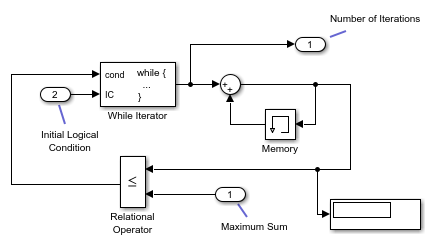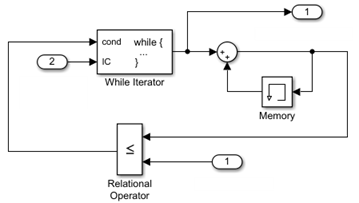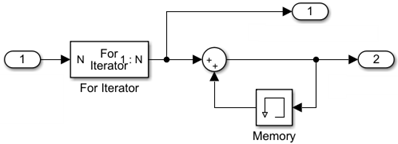Iterate Subsystem Execution with While Iterator and For Iterator Subsystems
Iterator subsystems, such as the While Iterator and For Iterator
subsystems, are a type of logically executed subsystem that executes one or more times during
a time step in response to a control block internal to the subsystem block. The control block
implements control logic similar to that expressed by a programming language construct such as
a while loop or a for loop.
For information about the For Each subsystem, which partitions input signals or mask parameters into individual elements or subarrays and applies an algorithm to each, see For Each Subsystem.
Note
The While Iterator Subsystem and For Iterator Subsystem
blocks must not contain blocks with continuous states (for example, blocks from the
Continuous block library). The sample times of all blocks within the subsystem must be
either inherited (-1) or constant (inf).
Models with While Structures
The While Iterator Subsystem block is a Subsystem block preconfigured as a starting point for creating a subsystem that repeats execution during a simulation time step while a logical (Boolean) expression is true.
Repeat Block Execution While Boolean Expression Is True
This example shows how to execute a subsystem until a maximum value is reached.
Open the model ex_while_iterator_block.

Open the while-iterator subsystem.

An input of 1 (true) to the While Iterator block activates the subsystem. At each time step, the current iterative number is added to a running total until a maximum sum is reached.
The while structure in the model can be represented with this pseudo code.
maximum_sum = 10 sum = 0 iteration_number = 1 condition = TRUE
WHILE (condition is TRUE) AND (iteration_number <= maximum_iterations)
sum = sum + iteration_number
IF (sum > maximum_sum) THEN
condition = FALSE
END IF
iteration_number = iteration_number + 1
END WHILECreate Model with While Structure
To create the example model, use this procedure.
Place a While Iterator Subsystem block in the Simulink® Editor. Double-click the subsystem block to display its contents.

Double-click the While Iterator block to open its block parameters dialog box. Set the Maximum number of iterations to
20and States when starting toreset. Select the Show iteration number port check box.Add Memory, Relational Operator, and Sum blocks. Connect blocks as shown. For the Memory block, select the Inherit sample time check box.

The iteration number from the output of the While Iterator block is added to its previous value until the sum is greater than or equal to the maximum sum from Inport block 1.
Navigate to the top level of the model.
Connect a Constant block to input port 2. This block provides the initial logical condition value for the While Iterator block. Set the Constant value to any non-zero number.
The While Iterator block requires an initial logical condition (input port labeled
IC) for its first iteration. This signal enables the While Iterator Subsystem block and must originate from outside the subsystem. If this value is nonzero, the first iteration takes place.Connect a second Constant block to input port 1. This block provides a maximum value for the iterative algorithm. The algorithm adds successive integers until a maximum value is reached.
Connect a Display block to output port 1. This block shows the number of iterations from the While Iterator block output port.
Run a simulation.
During a single time step, the first four iteration numbers are added for a total sum (
10). With the fifth iteration, the sum (15) is greater than the maximum sum (10), the iterations stop, and the block waits for the next time step.
Note
Simulation time does not advance during iterative executions of a While
Iterator Subsystem block. Nevertheless, blocks in the subsystem treat each
iteration as a time step. As a result, in a While Iterator Subsystem
block, the output of a block with states (that is, a block whose output depends on its
previous input), reflects the value of its input at the previous iteration of the
while loop. The output does not reflect the
block input at the previous simulation time step. For example, a Unit
Delay block in a While Iterator subsystem outputs the value of its input at
the previous iteration of the while loop, not the value at the
previous simulation time step.
Model with For Structures
The For Iterator Subsystem block is a Subsystem block preconfigured as a starting point for creating a subsystem that repeats execution during a simulation time step for a specified number of iterations.
Repeat Block Execution for Specified Number of Times
This example shows a subsystem that repeats execution during a simulation time step for a specified number of iterations.
Open the model ex_for_iterator_block.

Open the for-iterator subsystem.

The input to the For Iterator block specifies the number of iterations. At each time step, the current iterative number is added to a running total for 5 iterations.
The for structure in the model can be represented with this pseudo code.
number_of_iterations = 5 sum = 0
FOR iteration_number = 1 TO number_of_iterations
sum = sum + iteration_number
END FORCreate Model with For Structure
To create the example model, use this procedure.
Place a For Iterator Subsystem block in the Simulink Editor. Double-click the subsystem block to display its contents.

Double-click the For Iterator block to open its block parameters dialog box. Set States when starting to
resetand Iteration limit source toexternal.Add Memory, Sum, and Outport blocks. Connect blocks as shown. For the Memory block, select the Inherit sample time check box.

The iteration number from the output of the For Iterator block is added to its previous value for the specified number of iterations from Inport block 1.
Navigate to the top level of the model.
Connect a Constant block to input port 1. This block provides the number of iterations for the For Iterator block. Set the Constant value to
5.Connect Display blocks to output ports 1 and 2. These blocks shows the number of iterations from the For Iterator block output port and the sum from the Memory block.
Run a simulation.
During each time step, the first five iteration numbers are added for a total sum (
15).
See Also
While Iterator Subsystem | While Iterator | For Iterator Subsystem | For Iterator | Subsystem